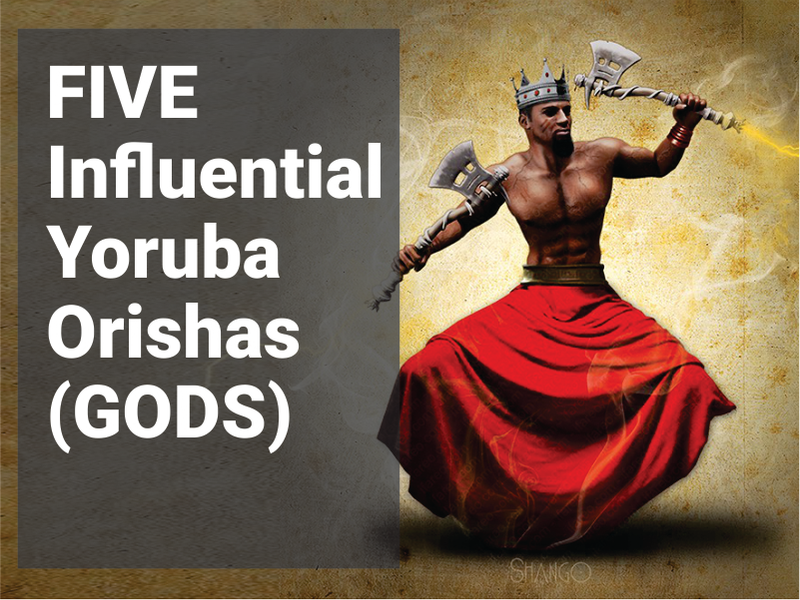The Yoruba people of West Africa have a rich and varied mythology. Their gods and goddesses cover a wide range of topics, from love and fertility to war and death. Here are some of the most important Yoruba deities.

Photo: Google image
The most important god in the Yoruba pantheon is Olorun, who is the creator god. He is often depicted as a sun god responsible for everything that happens in the world. Other major gods include Obatala, the god of fertility; Oshun, the goddess of love and beauty; and Shango, the god of thunder and lightning.
The Yoruba pantheon also includes a host of other lesser gods and spirits. These include the Orisha, which are guardian spirits that protect individuals or groups; the Iyami Aje, which are evil witches; and the Alugbati, mischievous water sprites.
Each god in the Yoruba pantheon has their own unique story and role to play in the world. They are all revered by the Yoruba people, who believe that they have an important part to play in their lives.
The Orisa
In Yoruba mythology, the Orisa are deities who rule over various aspects of the natural and spiritual world. Each god has their own unique personality and domain, and they work together to maintain balance in the world.
The Orisa are often depicted as human-like beings with superhuman strength and abilities. They are also said to be able to transform into animals or other forms.
Yoruba mythology teaches that there are four main Orisa: Obatala, Olorun, Oshun, and Shango. These four gods represent the elements of earth, air, water, and fire respectively.
The Orisa are revered and are thought to be able to help humans in their everyday lives. Many people turn to the Orisa for guidance and protection.
Obatala
It is said that Obatala is the god of creation and also the Yorubas’ chief god. The name Obatala (Oba-ti-ala.) means “Lord of the White Cloth,” which is explained by the fact that white is the color devoted to Obatala, whose temples, figures, and paraphernalia are always painted white, and whose followers wear white cloths. Another derivation is Oba-ti-ala, “Lord of Visions,” which gains some credence from the fact that Obatala is known as Orisha oj’enia, “The Orisha who enters man,” and Alabalese (Al-ba-ni-ase), “He who predicts the future,” because he inspires oracles and priests and reveals the future through visions. “Lord of the White Cloth,” on the other hand, is the most widely used and appears to be the proper translation. The god is always depicted wearing a white robe.
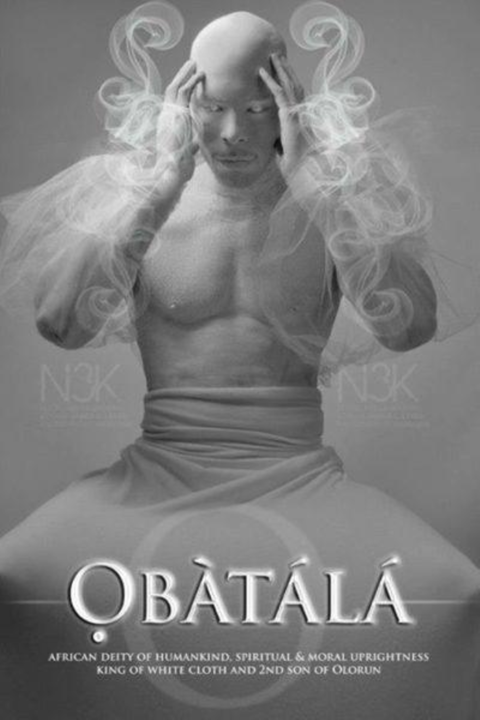
Photo by James C. Lewis
According to the priests, Obatala was created by Olorun, who then delegated control of the firmament and the world to him and retreated to slumber. Obatala is thus a sky-god, but in a more anthropomorphic form than Olorun, and fulfills functions that have nothing to do with the firmament. Obatala created the first man and woman out of clay, earning him the title of Alamorere, “Owner of the best clay,” and because he kneaded the clay himself, he is known as Orisha kpokpo, “Owner of the best clay.”
Shango
Shango, the deity of thunder and lightning, is the most powerful Yoruba god after Obatala; he was the second to emerge from Yemaja’s corpse. His name appears to be derived from shan, “to strike forcefully,” and go, “to befuddle,” and to be a reference to thunderclaps, which are said to be caused by powerful strokes. He is known as Jakuta, which means “Hurler of Stones” or “Fighter with Stones” (Ja, to hurl from aloft, or ja, to battle, and okuta, stone); and stone weapons, which have long since ceased to be used in West Africa, are thought to be his thunderbolts.
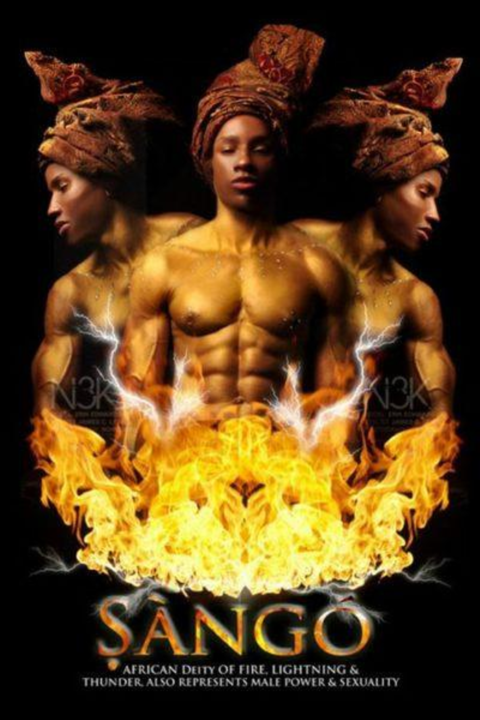
Photo by James C. Lewis
Oya, the Niger, Oshun, the same-named river that starts in Ijesa and goes into the waterway between Lagos and the Lekki lagoon, close to Emina, and Oba, another river, that rises in Ibadan and flows into the Kradu Water, were the three women that Shango wed. When their husband leaves the house, all three of them walk with him. Oya brings her messenger Afefe (also known as the Wind or Gale of Wind), while Oshun and Oba each carry his bow and sword. Biri (Darkness), a servant of Shaugo, attends the event.
Shango is offered oxen, lambs, and birds, as well as humans on significant occasions. His colors are white and crimson. 16 cowries are tossed on the ground for him to examine; those with the highest backs are considered favorable, while those with the lowest backs are considered the opposite.
Ogun
In Yoruba mythology, Ogun is the god of war and iron. “One who pierces” is what the name Ogun means (gun, to pierce, or thrust with something pointed). People who employ iron tools or weapons and blacksmiths in particular venerate him. Ogun can be represented by any iron object, and because iron ore is located on the ground, he holds it in high regard. He is among the individuals who emerged from Yemaja’s body.
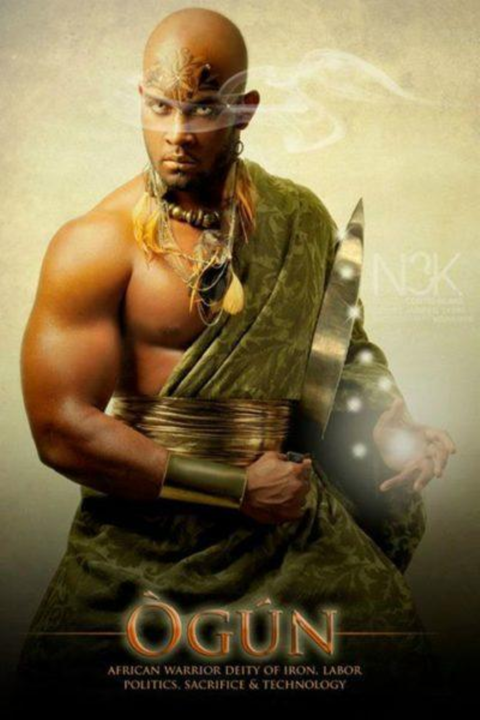
Photo by James C. Lewis
He is also the patron deity of blacksmiths, hunters, and warriors. Ogun is one of the most important gods in the Yoruba pantheon, and is honored with many festivals and celebrations throughout the year.
Ogun is usually depicted as a tall, muscular man carrying an axe or sword. He is usually associated with the color red, and his symbols include fire, iron, and animals such as the dog and the ram. Ogun is a powerful and vital god, and is revered for his strength, courage, and ability to protect his people. He is also seen as a guardian of justice, and is invoked when legal disputes need to be settled.
A dog, together with chickens, palm oil, and other small items of sustenance, are the standard sacrifices made to Ogun. An elderly dog must be sacrificed to Ogun, according to a saying, implying that Ogun demands the best. A dog’s head, serving as a symbol of this sacrifice, is sometimes seen tied up in a prominent location within blacksmiths’ workshops. But on particularly significant occasions, a human victim is presented, and, as in the case of a sacrifice to Elegba, the body is hung from a tree while the entrails are displayed before the picture.
If you are ever in need of strength or protection, call on Ogun. He will always be there to help you fight your battles and defend your honor.
Oshun
Oshun is the Yoruba goddess of love, beauty, and fertility. She is associated with the river Niger in West Africa, and is often depicted holding a river shell or wearing a crown of freshwater shells.
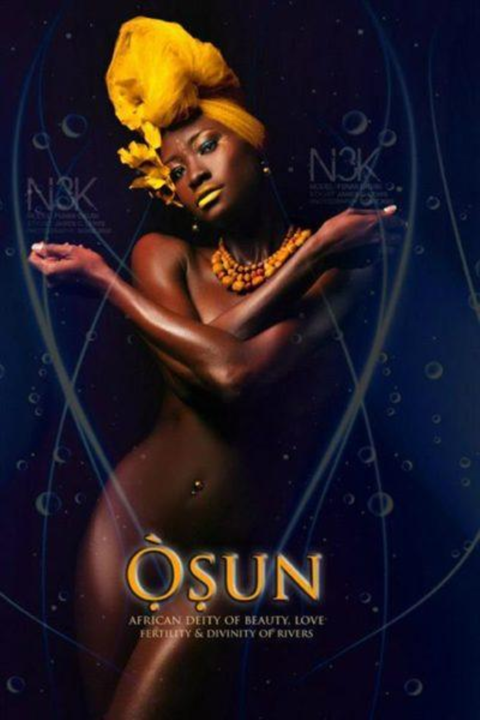
Photo by James C. Lewis
Oshun is a kind and loving goddess, but she can also be fierce when she needs to be. She is known for her ability to help people in need, and her willingness to fight for justice.
If you are looking for a goddess to help you with matters of the heart, Oshun is the perfect choice. She can help you find love, heal a broken heart, and increase your fertility.
Esu
Esu is the god of mischief in Yoruba religion. He is also known as the Trickster and associated with chaos, disorder, and confusion. Esu is usually depicted as a human with animal features, such as horns or hooves.
Esu is a god of mischief, and as such, he has many different aspects. He can be trickster, jester, and even a bit of a rabble-rouser. But at his core, he is a god of change and chaos.
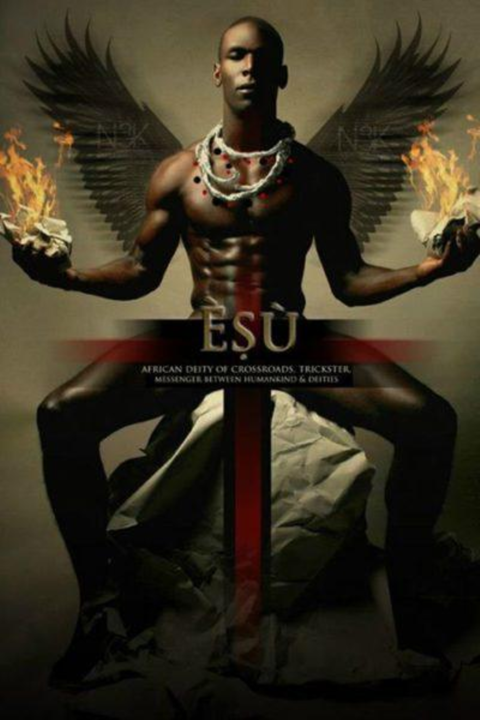
Photo by James C. Lewis
Esu is known for his ability to disrupt the status quo and to upend the expectations of others. He is the god of surprises, and as such, he is often associated with change. Whether that change is good or bad is up to interpretation; but it is change nonetheless.
Esu is also a god of chaos. He revels in creating disorder and confusion. For him, the world is a playground and he loves to stir things up just for the fun of it. This can be seen in his interactions with humans, where he often leads them astray or causes them to behave in ways that are out of character for them.
Despite his mischievous nature, Esu is not all bad. He also has a protective side, and he is known for helping those who have been wronged or who are facing difficult situations. He is a god of justice, and he will fight for those who cannot fight for themselves.
Esu is usually depicted as a young man with a mischievous grin on his face. He is often shown carrying a bag of tricks, which he uses to play pranks on people. He is also said to be very quick and agile, able to outrun anyone who tries to chase him.
People who worship Esu offer him gifts of food and drink, and often leave out small offering.
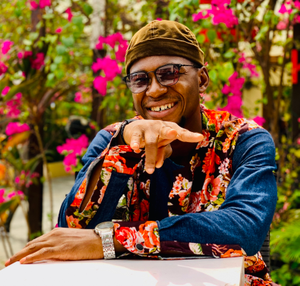
Minna Davies is a creative writer and a thespian with a degree in theatre arts from the University of Lagos. He has been privileged to have some of his works featured on Nigeria’s big stages. It is important to dream, but if no one gets to see it, it is as good as dead.

